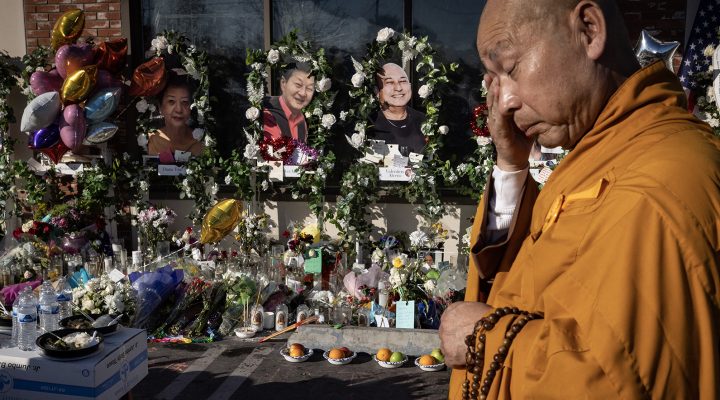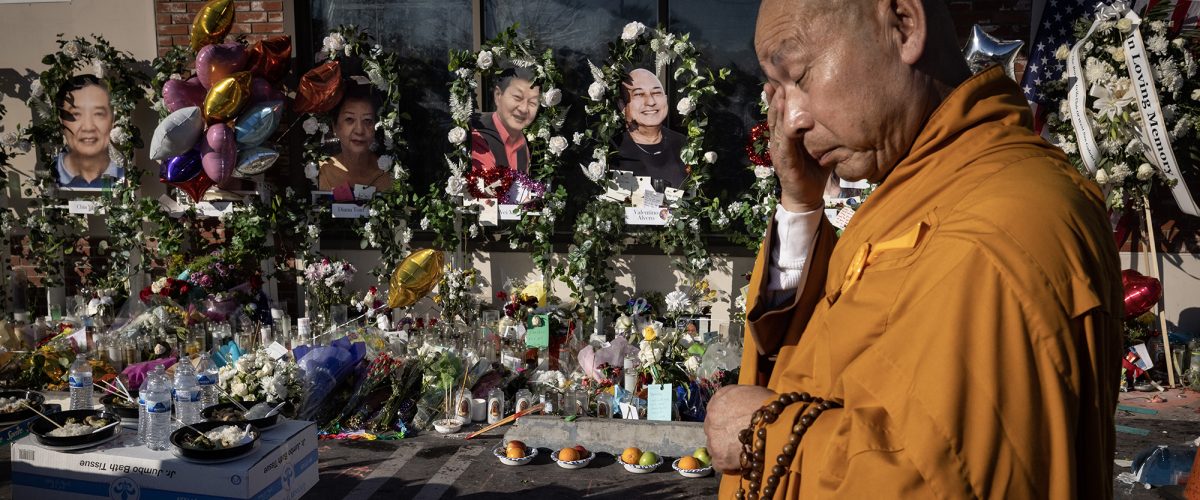The Monterey Park shooting was the 36th mass shooting in the USA in this young year.
Reporters have trouble covering all the violence in our culture. Some of the violence stands out in graphic and horrifying detail. A 6-year-old child shot his teacher in Virginia. The Monterey Park shooter was a 72-year-old man who opened fire in public. The television news, where if “it bleeds it leads,” has trouble knowing which shooting will garner the most ratings. Violence has embedded its ugliness into the fabric of our culture.
In Memphis, five African American policemen violently beat an African American man to death. The graphic video of that act now plays on an endless loop for a media and public that can’t get enough of violence. Networks now employ a plethora of police and legal consultants to feed our insatiable appetite for violence. What once occurred in our movies has now come to our streets and communities.
“What once occurred in our movies has now come to our streets and communities.”
One of the Hebrew prophets, Habakkuk, overwhelmed by violence, turned to prayer: “O Lord, how long shall I cry for help, and you will not listen? Or cry to you ‘Violence!’ and you will not save? Why do you make me see wrongdoing and look at trouble? Destruction and violence are before me; strife and contention arise. So the law becomes slack and justice never prevails. The wicked surround the righteous — therefore judgment comes forth perverted.”
No doubt there are still millions praying for answers to the violence, consolation for the violated, even prayers for the violent actors. But on the national stage, where we debate and argue and accuse one another, rather than seek solutions for violence, our national response seems to be to blame one political party or the other for violence. In this respect, violence becomes a weapon to vilify the other side.
The words we sling at one another never actually address the violence. These are words that never led to action. Our response to violence is the weaponization of language. We respond to violence with violence.
From Memphis to Minnesota and from Atlanta to Alaska, violence begets not only violence but an avalanche of words spewed out to blame the violence on the other side. Who do you know who really wants to compromise with their ideas? Who on the left will volunteer to be part of a delegation to go discuss the violence in Atlanta with Mitch McConnell, Kevin McCarthy or a team from Fox News? Who on the right will come to a symposium with 10 of the finest writers on race, its history and its philosophy, and look for solutions to the violence in Minnesota that left an African American man dead at the hands of white cops? Who will help create a blueprint for something less than violence?
“I don’t have much confidence in either party to provide us with help with it comes to violence, but I believe I know where to turn.”
I don’t have much confidence in either party to provide us with help when it comes to violence, but I believe I know where to turn. There already exists in the United States and around the world an institution founded to be the antithesis of violence. With Stanley Hauerwas, I argue that the teaching of Jesus presupposes the existence of a community constituted by the practice of nonviolence. This community is known as the church.
Our only task here is to disengage the church from the ongoing rhetorical violence long enough to recover her true calling as peacemakers or pacifists.
A few basic theological claims are necessary to focus our attention on the nonviolent community known as the church. John Howard Yoder claims Jesus gave his followers a new way to deal with violence — by suffering. Christianity came into the world rejecting messianic violence as a means of national freedom and accepting a Suffering Servant Messiah. Jesus modeled the Suffering Servant in his refusal to use the violence of the world to achieve peace.
Stanley Hauerwas connects the dots from the life of Jesus to the life of the church: “The truth, of course, is that the Father has sent his Son so that we — that is, the church — might be an alternative politics, a politics of truth, to that of the world. The world’s politics is based on violence: kill or be killed. That is the politics that has been overwhelmed in Christ’s death and resurrection. A people have been created through the work of the Spirit to be an alternative politics to the politics of the lie — lies so blatant that we believe they must be true as otherwise they are so absurd. Lies that lead us to believe that peace can be achieved through war.”
“The church has a tortured history of not being a nonviolent community.”
The church, however, has a tortured history of not being a nonviolent community. Instead, we have at times justified and practiced violence against those as not being “God’s people.” We have gleefully perverted Christ’s incarnation of love, forgiveness and reconciliation into horrifying forms of punishment and violence. Heads have rolled, bodies have been drowned and burned, sawn into pieces, hung from the limbs of trees, exterminated — all in the name of God.
Perhaps we need a solid dose of Charles Taylor, who says in A Secular Age that proponents on all sides are throwing “huger rocks … than are safe for dwellers in glass houses,” and “both sides need a good dose of humility” concerning how “fragile” their positions are and how deeply each is implicated in histories of violence.
Taylor recommends a Jewish response known as tikkun olam, or “heal the world” — bit by small bit — and to free such efforts from the exclusionary moves that so often insinuate themselves into both Christian and humanist responses to the world’s suffering.
“Only a community of the forgiven can support one another in the demanding task of forgiving the enemy.”
The Christian response to violence assumes the Scriptures only make sense in the context of a people committed to reconciliation, not revenge. In other words, the church is a body that has been trained to be forgiven. We are the community constituted by the forgiven. Only a community of the forgiven can support one another in the demanding task of forgiving the enemy.
Our current inability or paralysis in the wake of violence only gets more difficult when fellow Christians are no longer capable of seeing one another as brothers and sisters but only as enemies.
The apparent weakness of my argument is that I haven’t shown how to stop the violence or how to generate an ethos of nonviolence. I admit to this failure and to my own conviction that violence is unavoidable. What I am arguing is that a community of nonviolence is necessary as a witness in our world of violence.
Without such a community, the world has no way of knowing that peace is God’s purpose. Without such a community, the world will continue to accept lying, cheating, stealing, abusing and killing as sometimes necessary in order to win.
There is nothing more important that we can do for the world as Christians than to resolve to be nonviolent in every area of life.
Rodney W. Kennedy is a pastor in New York state and serves as a preaching instructor at Palmer Theological Seminary. He is the author of nine books, including the newly released The Immaculate Mistake, about how evangelical Christians gave birth to Donald Trump.
Related articles:
Five ways to practice tikkun olam and repair the world | Opinion by Susan Shaw
The other speech Martin Luther King gave at Southern Seminary in 1961


